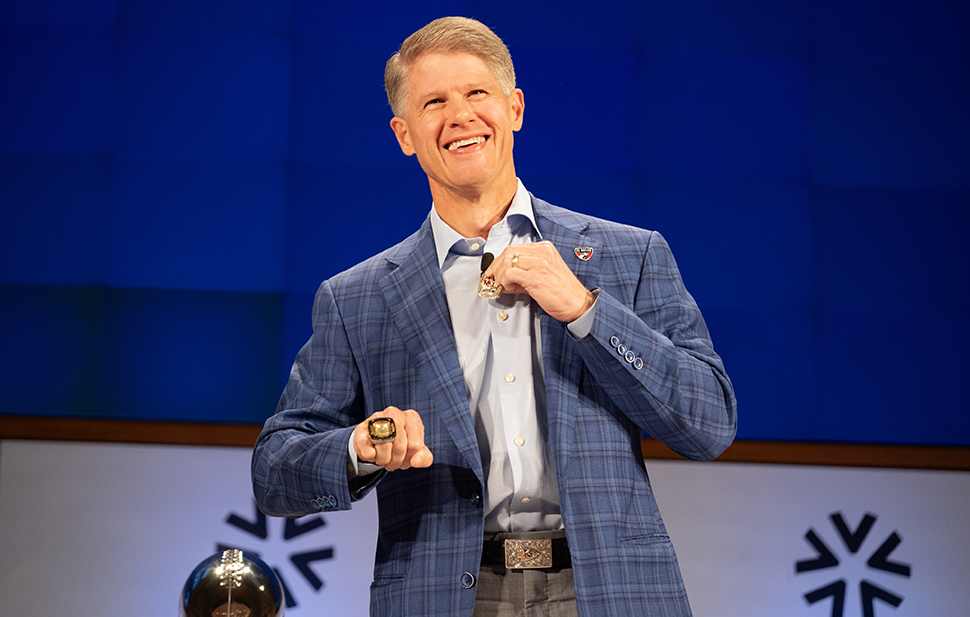In a move that has taken fans and media outlets by storm, Kansas City Chiefs CEO Clark Hunt has officially banned pop superstar Taylor Swift from attending any of the team’s home games at Arrowhead Stadium. This surprising decision has sparked widespread speculation and debate among fans, analysts, and Swifties alike, as the intersection of sports and entertainment continues to generate buzz in today’s cultural landscape. Swift, known not only for her chart-topping hits but also for her high-profile relationships and public persona, has captured the attention of millions, leading many to question the motivations behind Hunt’s controversial decree.

The decision comes on the heels of Swift’s recent appearances at Chiefs games, where her support for tight end Travis Kelce, rumored to be her new romantic interest, attracted a significant amount of media attention and public interest. The sight of Swift cheering from the stands, accompanied by her trademark enthusiasm, undeniably brought a new level of excitement and flair to the games, drawing in not just football fans but also Swift’s massive fanbase, who may not have otherwise tuned into NFL events. This crossover of pop music and professional sports seemed to be a mutually beneficial arrangement that captivated audiences and broadened the Chiefs’ appeal.
However, Hunt’s ban raises questions about the balance of celebrity influence in sports. In a world where athletes and entertainers often share the spotlight, the implications of Swift’s presence might have complicated the dynamics within the team and among its loyal fanbase. Some speculate that the decision could be aimed at reducing distractions and maintaining a focus on the game itself. The last thing a professional sports team needs, especially one vying for a championship title, is unnecessary media frenzy that diverts attention away from the game strategy and player performance.
Furthermore, the decision could also reflect attempts to maintain the integrity of the sporting event. As Hunt navigates the fine line between celebrity endorsement and the sanctity of the game, he may feel that Swift’s high-profile presence emphasized a celebrity culture that could potentially overshadow the team’s performance. The Chiefs, after all, are contenders with significant aspirations for the season, and ensuring that the players are undistracted and focused might be paramount for their success.
Conversely, there are many who argue that Swift’s appearance at games has been a boon for the Chiefs brand, drawing in younger fans and a more diverse audience. In an era where sports teams are always looking to expand their reach and engage with new demographics, Swift’s ability to bridge the gap between music lovers and football enthusiasts is something that should be celebrated rather than stifled. The Kansas City Chiefs have already enjoyed a surge in fan engagement and ticket sales linked to Swift’s appearances, suggesting that such celebrity involvement can be advantageous.
As fans react to the news, Twitter and social media have exploded with mixed reactions. Some supporters express disappointment at the ban, claiming it “takes the fun out of the experience,” while others echo the sentiment that maintaining focus during the season is crucial for the players’ performance. The debate transcends simple sports commentary; it delves into deeper conversations about the role of celebrities in sports, and how teams manage the balance between entertainment and athleticism.
In conclusion, Clark Hunt’s decision to ban Taylor Swift from attending any of the Kansas City Chiefs’ home games adds a complex layer to the intertwined worlds of sports and entertainment. It challenges fans to consider the implications of celebrity presence in professional sports and raises important questions about distractions, integrity, and commercial interests. As the season progresses and the Chiefs strive for success on the field, the spotlight remains on both their performance and the impact of this unprecedented ruling with every game played at Arrowhead Stadium. Will this decision bolster focus and determination among players, or will it alienate a segment of the fanbase eager for the added spark that Swift brings? Only time will tell.
News
Billionaire Elon Musk confirmed that he has 12 children with 3 women, he must start redistributing inheritance when the 12th child is born
Billionaire Elon Musk has officially confirmed that he has had a third child with his female subordinate Shivon Zilis. Currently, Musk has a total of 12 children with 3 wоmen. In an interview with Page Six (USA), Elon Musk (52…
Every time he wins an award, Siya Kolisi gives his wife an expensive supercar to add to his car collection
Following his relocation to France, Springboks captain Siya Kolisi has added a stylish new set of wheels to his collection. Feast your eyes on his latest vehicle! Kolisi was pleasantly surprised with a brand-new Range Rover, a generous gift presented…
Justin Baldoni’s Man Enough Co-Host Liz Plank Leaves Podcast After Blake Lively Claims: ‘We All Deserve Better’ (Exclusive)
On Dec. 20 Lively accused Baldoni of sexual harassment on set and a retaliatory public smear campaign in a legal filing Justin Baldoni, Blake Lively and Liz Plank. Journalist and author Liz Plank co-hosts the podcast The Man Enough with actor-filmmaker…
Heisman Winner Travis Hunter Deactivates Instagram Account as Hatred Toward Fiancée Leanna Lenee Continues
The controversy initially began as Hunter received the Heisman trophy and many fans called out Lenee’s behavior in videos that circulated online Travis Hunter Leanna Lanee. Amid the continued vitriol going around online about his fiancée Leanna Lenee, 2024 Heisman…
Tallulah Willis Reveals She’s Engaged to Musician Justin Acee
The 30-year-old daughter of Demi Moore and Bruce Willis announced her engagement on Monday, Dec. 23 Tallulah Willis announces engagement to Justin Acee. Tallulah Willis is ready to walk down the aisle! “Everyday @justinacee,” she wrote next to the social media post…
Blake Lively’s A Simple Favor 2 Costar Michele Morrone Says He ‘Felt Her Pain’ Over Justin Baldoni’s Alleged Behavior
Morrone filmed ‘A Simple Favor 2’ with Lively shortly after she wrapped ‘It Ends With Us’ with Baldoni Michele Morrone and his costar Blake Lively. Michele Morrone is lending his support to his costar Blake Lively. On Monday, Dec. 23,…
End of content
No more pages to load











